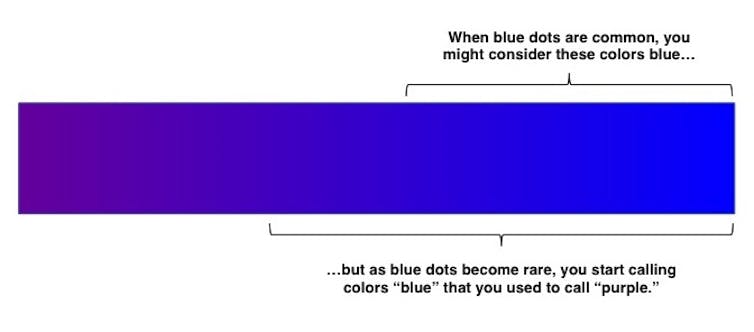Why Our Brains Constantly Practise Novel Threats
FromThe Conversation:
When something becomes rare, nosotros sometimes meet it inward to a greater extent than places than ever. It’s a quirk that tin impair our judgment, but may live on i nosotros tin control.
When something becomes rare, nosotros sometimes meet it inward to a greater extent than places than ever. It’s a quirk that tin impair our judgment, but may live on i nosotros tin control.
Why create many problems inward life appear to stubbornly stick around, no thing how difficult people move to create them? It turns out that a quirk inward the way human brains procedure data agency that when something becomes rare, nosotros sometimes meet it inward to a greater extent than places than ever.
Think of a “neighborhood watch” made upward of volunteers who telephone phone the police pull when they meet anything suspicious. Imagine a novel volunteer who joins the picket to help lower offense inward the area. When they get-go start volunteering, they enhance the warning when they meet signs of serious crimes, similar assail or burglary.
Let’s assume these efforts help and, over time, assaults in addition to burglaries perish rarer inward the neighborhood. What would the volunteer create next? One possibility is that they would relax in addition to halt calling the police. After all, the serious crimes they used to worry nigh are a thing of the past.
But yous may part the intuition my enquiry grouping had – that many volunteers inward this province of affairs wouldn’t relax only because offense went down. Instead, they’d start calling things “suspicious” that they would never bring cared nigh dorsum when offense was high, similar jaywalking or loitering at night.
You tin in all likelihood scream upward of many similar situations inward which problems never appear to perish away, because people proceed changing how they define them. This is sometimes called “concept creep,” or “moving the goalposts,” in addition to it tin live on a frustrating experience. How tin yous know if you’re making progress solving a problem, when yous proceed redefining what it agency to solve it? My colleagues in addition to I wanted to understand when this form of demeanour happens, why, in addition to if it tin live on prevented.
Looking for problem
To report how concepts alter when they perish less common, nosotros brought volunteers into our laboratory in addition to gave them a elementary chore – to expect at a serial of computer-generated faces in addition to create upward one's withdraw heed which ones appear “threatening.” The faces had been carefully designed past times researchers to hit from really intimidating to really harmless.
As nosotros showed people fewer in addition to fewer threatening faces over time, nosotros flora that they expanded their Definition of “threatening” to include a wider hit of faces. In other words, when they ran out of threatening faces to find, they started calling faces threatening that they used to telephone phone harmless. Rather than beingness a consistent category, what people considered “threats” depended on how many threats they had seen lately.
This form of inconsistency isn’t express to judgments nigh threat. In only about other experiment, nosotros asked people to brand an fifty-fifty simpler decision: whether colored dots on a covert were bluish or purple.
As the context changes, then create the boundaries of your categories. David Levari, CC BY-ND
As bluish dots became rare, people started calling slightly royal dots blue. They fifty-fifty did this when nosotros told them bluish dots were going to perish rare, or offered them cash prizes to remain consistent over time. These results propose that this demeanour isn’t exclusively nether witting command – otherwise, people would bring been able to live on consistent to earn a cash prize....MOREHT: Undark, from whom I swiped the headline.

No comments